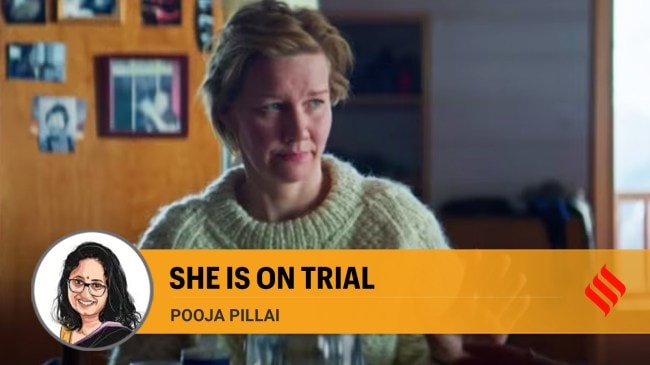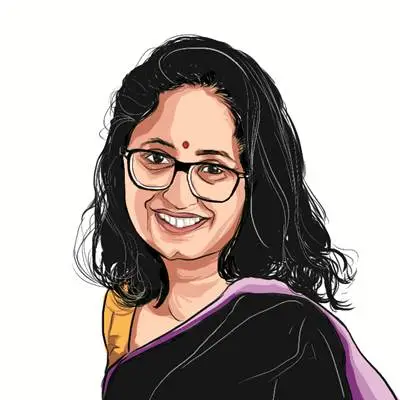Opinion ‘Anatomy of a Fall’ refuses to make monsters out of ambitious women
It does not allow its protagonist's ambition to become a weapon in the hands of a society that cannot understand her. That it pulls this off by giving her the role which, in real life, is often played by men, is the richly ironic takeaway
 Sandra Huller in Justine Triet's Anatomy of a Fall. (Video screengrab/ YouTube)
Sandra Huller in Justine Triet's Anatomy of a Fall. (Video screengrab/ YouTube) Nearly seven years ago, a comic titled Fallait Demander (in English, You Should’ve Asked) by French artist Emma went viral. It explained the concept of the “mental load” that women, seen by the men in their lives as the “manager of household chores”, are always expected to carry. This results in an overburdening, as women are also seen as the natural executors of these chores by men, who argue that should the women feel the work weighing them down, all they need to do is “assign” tasks (“You should’ve asked”). Perfectly articulating the crushing pressure of this invisible labour most women in heterosexual relationships perform, it’s no wonder that Emma’s comic became one of the crucial internet-era texts of feminism. Among other things, it put in the dock the idea of the “liberated” 21st-century woman, who “has it all” — a family and a career — by showing that even when she works outside the home, the assumption that the job of running a household is naturally the woman’s remit, is very much alive.
It is a clever inversion of this notion of the “mental load” that makes one of the pivotal scenes in Justine Triet’s film Anatomy of a Fall — winner of the Palme d’Or at Cannes and a Best Picture contender at this year’s Academy Awards — so powerful. Sandra Voyter (played by Sandra Huller) is a well-known novelist, on trial for the alleged murder of her husband. A key piece of evidence used against her is a recording of an argument, in which her husband Samuel (Samuel Theis) can be heard accusing Sandra of placing the entire burden of managing their lives — particularly caring for and homeschooling their son — on him, thus leaving her free to pursue her writerly ambitions. Samuel himself has had to shelve his dreams of a career as a novelist, because, he says, he’s the one bearing the “burden” in the marriage, leaving him no time for anything else. The recording builds an image of a woman unfettered by the usual — the expected — sense of responsibility for running a house, being a child’s primary caretaker and putting her own life and dreams on hold for the sake of others. In other words, this is a woman who behaves “like a man”.
The film forces viewers to wonder whether this is the real reason that Sandra goes on trial. There is no physical evidence connecting her to her husband’s death and the only “witness” is their son Daniel (Milo Machado-Graner), who was blinded in an accident years ago. Everything that makes Sandra the obvious villain in the eyes of the prosecution emerges from her refusal to conform to the traditional role of a wife and mother, particularly her ability to wall herself off from the demands of family in order to write and be successful (building “a room of her own”, as Virginia Woolf might have put it). Were the roles to be reversed — if, for example, Samuel was the successful novelist, and Sandra the harried spouse struggling to keep it all together at the cost of her own aspirations — would she have so easily been demonised?
It is these double standards that Triet sought to draw attention to in the film. In an interview to The New York Times, she said, “I wanted to show how a woman might come under attack precisely because of her intelligence, ambition and her mental fortitude…[Sandra] was broken down by a moralistic society that intensely scrutinises the way women choose to lead their lives.”
The woman who is punished for being ambitious is an old trope in cinema, one which has, admittedly, evolved in response to feminist criticism. Yet, even films which tend to view such women in a sympathetic light, such as Black Swan (2011) or The Devil Wears Prada (2006), serve more as cautionary tales for women, focusing more on how ambition can distort them, turning them into grotesque, unnatural beings — monsters, in other words. We should, such stories seem to say, pity these distorted figures and learn from them about what it takes for women to survive in a hard-hearted world.
Anatomy of a Fall refuses to do this. It refuses to make a monster out of Sandra and does not allow her ambition to become a weapon in the hands of a society that cannot understand her. That it pulls this off by giving her the role which, in real life, is often played by men, is the richly ironic takeaway. Sometimes, that’s what it takes to humanise an ambitious woman.
pooja.pillai@expressindia.com





